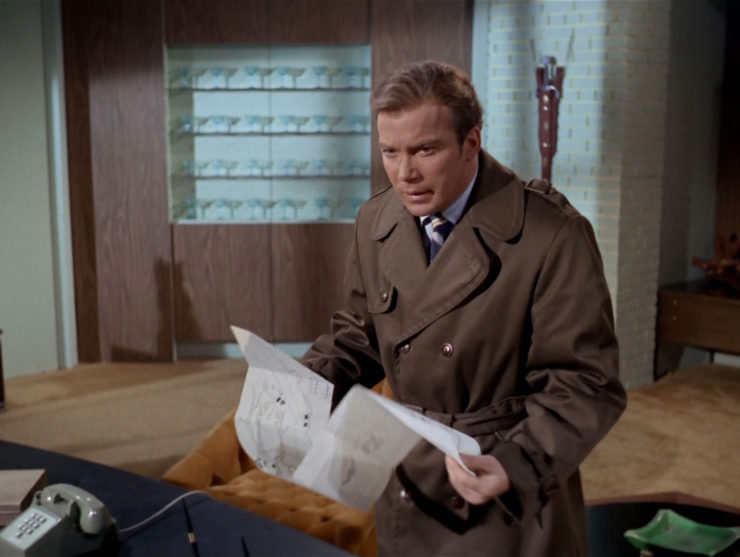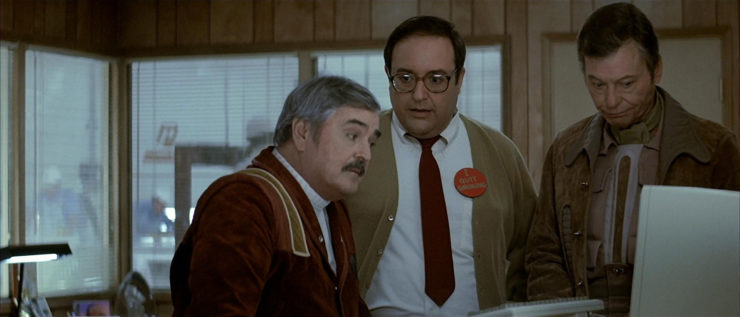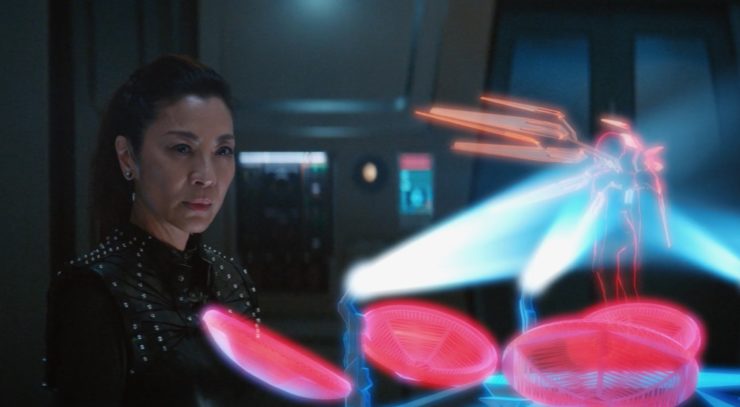At the very start of the Star Trek: Discovery episode “The Red Angel,” the history of time travel in the Trek universe got a little more wrinkled. According to this episode, Starfleet has been desperate to develop some reliable time travel since the very early part of the 23rd century. This feels a little crazy, but what’s even crazier is that a close reading of nearly every single time travel episode of the original series supports this idea. Yep. That’s right. Discovery’s “temporal arms race” seems to be something Captain Kirk was totally involved with during TOS. Here’s how it all works.
Spoilers ahead for Star Trek: Discovery, Season 2, Episode 10, “The Red Angel.”
In “The Red Angel,” Captain Leland says that Starfleet started trying to develop time travel technology because they were worried the Klingons would do it first, and go back in time and prevent humanity from ever existing. In the context of this episode, Leland’s revelation helps to explain the Red Angel/Project Daedalus suit and the fate of Burnham’s parents. But this “temporal arms race” has wider implications beyond this season of Discovery.
The notion that Section 31 agents have already time traveled at this point in Trek history is confirmed by this episode. We know one Section 31 agent—Michael Burnham’s mom—has traveled through time, but what if she’s not the only one? At no point does Leland say that Project Daedalus was the only time travel tech being developed by Section 31. The Red Angel suit seems to rely on those notoriously unpredictable time crystals Harry Mudd had in the season 1 episode, “Magic to Make the Sanest Man Go Mad,” which means the temporal arms race must have caused Section 31 to pursue other ways of making time travel work consistently.
Fast-forward from 2257 (Discovery) to 2265 (the original Star Trek). At the end of the episode “The Naked Time,” Kirk, Spock and the crew of the Enterprise accidentally stumble upon a super-reliable form of time travel: the so-called slingshot-effect. This is the same technique that Kirk will use on-purpose in “Assignment: Earth” and, more famously, in Star Trek IV: The Voyage Home. In Trek’s second ever time travel episode, “Tomorrow Is Yesterday,” the Enterprise is thrown back to Earth’s past via the slingshot-effect caused by a “black star” hanging out near Starbase 9. Early in the episode, Kirk tells Uhura that he wants Starfleet to know about the location of the black star, ASAP.
Now, the obvious reason Kirk does this is that the black star is a navigational hazard. But the less-obvious reason may be that Kirk has standing orders to document and report anything he discovers about time travel. Is Kirk working for Section 31? Probably not, but he might actively be gathering intel for Starfleet about time travel. This may sound far-fetched, but in “The City on the Edge of Forever,” the Enterprise is straight-up investigating crazy time distortions, and Kirk is really quick to make sure Starfleet knows what he’s doing. Famously, the episode is just a cold-open on the Enterprise passing through dangerous waves in time, in orbit of the planet which is home to the Guardian of Forever. Kirk quickly tells Uhura to send Starfleet all of his logs about “the strange readings on our instruments…and how they led us here.” Kirk calls this move a “precautionary measure,”—Kirk knows how dangerous and unpredictable time travel can be, but it also suggests that as Starfleet captain, he knows that time travel phenomenon has huge strategic importance. The takeaway here is obvious: Kirk brings the Enterprise to a dangerous planet, on purpose, to investigate the slightest possibility of time travel tech. If we take the Discovery continuity seriously, this could mean Kirk wasn’t just curious about temporal distortions. Instead, it was part of his job.

The final piece of the TOS time travel puzzle is “Assignment: Earth,” an episode in which Kirk and Spock basically behave more like Section 31 agents than they do Starfleet officers. In this episode, the Enterprise is actually ordered to travel back in time to Earth’s past to observe the launch of an orbiting nuclear platform in 1968. Obviously, the existence of this orbiting nuclear platform is mostly fictitious, but the fact that the Enterprise is traveling through time—using the slingshot effect—as a matter of course at this point is deeply revealing. In some ways, the Enterprise’s flagrant time travel could be the Starfleet version of temporal saber rattling. There’s nothing to suggest that the mission of the Enterprise is being kept secret at all, which suggests Starfleet may have wanted other governments to know about it. In other words: Hey, guess what Klingons! We’re so good at time travel, we can go back in time to our own planet and mess with nuclear proliferation! So, you know, don’t mess with us!
“Assignment: Earth” also is vaguely suggestive of Discovery insofar as Gary Seven is aware of time travel and the future history of the galaxy. In “The Red Angel,” Leland floats the theory that certain technological leaps on Earth were a result of time travel. Aspects of “Assignment: Earth” suggest this in reverse: because of time travel interference from the Enterprise, the United States decides not to pursue orbital nuclear technology. Plus, the fact that Gary Seven has such advanced tech (some of which might be from the future) certainly indicates some of that tech could have leaked into 20th century Earth.
(The only other time travel episode in TOS is “All Our Yesterdays,” in which the Enterprise stumbles on some time alien tech, but that really seems like an accident. Kirk wouldn’t get himself accused of being a witch, on purpose, right?)
Anyway, Leland’s theory about time travel creating advanced technology is already proven true in the existing Trek movies. Famously, in Star Trek IV: The Voyage Home, Scotty, and Bones create (or fulfill?) a bootstraps paradox by giving the recently-tobacco free Dr. Nicholas the formula for transparent aluminum. When Bones worries that he and Scotty are altering the past, Scotty quips, “How do we know he didn’t invent the thing?” It’s one of the greatest jokes in The Voyage Home, but in the context of time travel in Trek canon, it totally seems to indicate that on some level, Scotty buys into the exact same theory that Leland mentions in “The Red Angel.”

Scotty is not a Section 31 agent. Kirk probably isn’t either. But, by the time of the original series, and well into the classic movies, Starfleet is obsessed enough with time travel that everyone is thinking about it all the time. And, if Discovery does prove that certain advanced technology in Star Trek is created by time travel paradoxes, then suddenly, a lot of the tech inconsistencies across all the various incarnations of the franchise can easily be explained. And yes, this all could mean that Tyler’s TNG-style combadge was totally created by a bootstraps paradox. Or, to put it in Scotty-parlance; how do we know Tyler didn’t invent the thing?
Ryan Britt is the author of Luke Skywalker Can’t Read and an editor at Fatherly. He is a longtime contributor to Tor.com.











There was the Temporal Cold War in Enterprise, so we can assume that StarFleet knows just how dangerous time travel can be. Presumably why the UFP created the DTI.
Looking forward to how CLB is going to mix all this together.
I see no urgent reason to take Discovery continuity seriously. The show runners don’t.
Look, these people are explorers. When they discover something noteworthy, they inform Starfleet Command. Of course that goes for time travel too. No need to assume that “everyone is thinking about it all the time”.
Discovery and S31 or not, of course part of Kirk’s job is recording time anomalies. He’s on an exploration mission. Yup, what Jana said.
Yes, what MaGnUs and Jana said. Starfleet wants to explore and understand the universe. Its mandate of discovery (ahem) would include all the universe’s wild and wacky, timey-wimey, wibbly-wobbly stuff <G>.
I am not a DSC hater and haven’t even seen season 2 yet. I do plan to watch it; based on what I’ve been reading, I think I’ll enjoy most of it. But it drives me BONKERS that the only element of Trek canon that seems to be consistent across all the iterations and all the timelines is Section 31. I have hated the idea of Section 31 from the time DS9 introduced it; I was aghast that the JJ films picked up on it; and I am disappointed that DSC seems to be (again, from what I’ve read) running wild with it, much less that it could be the subject of a spin-off series.
As Ken Rey of the Mission Log podcast has said on numerous occasions (this is not a paid plug), if we can’t even imagine a society where nothing shady is going on, a society where we can’t achieve good ends by anything other than illegal and immoral means, then we are really up a creek. Section 31 is an in-universe admission that, “No, nothing as good as the Federation and Starfleet could ever exist.”
I am not a froth-at-the-mouth “they’ve ruined Star Trek” kind of guy, but if anything were to make me one, it would be Section 31!
@5/writermpoteet: Great comment!
@5
I hear what you’re saying, but even though I personally find S31 tiresome, I think cracks in the Federation’s Utopian Facade make the UFP more interesting. Before S31 ever existed, there was the Cardassian border deal and the advent of the Maquis. I know fandom is split on the Maquis, but count me as someone who related to their cause, if not always their methods (Eddington was a dick). The Federation made a bad deal and screwed some people in the interest of peace with a race no one really trusted. And it was all for nothing in the end since peace was the last thing they got. I really enjoyed the Paradise Lost two-parter and absolutely LOVED In the Pale Moonlight on DS9. Good people driven to extreme measures in the grey areas of morality.
These stories that show that utopia has to be fought for by imperfect (and sometimes dirty) people fascinate me more than a boring society that has miraculously conquered human-nature. Or insert any species you want instead of human. It’s far more realistic. And I don’t even consider myself a pessimist.
I AM tired of S31 though. Georgiou is interesting, mostly due to the actress herself. Anxious to move on from it. I wish Mount’s Pike could have had a season of real…discovery…instead of this.
Meh, couldn’t they just use Gary Seven again for this kind of stuff? His cat was more interesting than Section 31.
@7/matt: Star Trek has always featured imperfect people, just not dirty ones – that’s a big difference.
And human nature isn’t static. When you go back a few centuries, organisations like the Red Cross, the United Nations or even representative democracy seem positively utopian. There are less wars now than there used to be. We have organisations that help shipwrecked people instead of killing and plundering them. And so on. It isn’t unrealistic to extend this line into the future, and that’s what Star Trek used to do.
Also, Star Trek episodes often make a statement about the real world. Such being the case, I prefer the stories where war is treated as something that can be avoided to the ones where war is treated as a fact of life.
I’m not convinced that the Cardassian border deal was a bad deal. What would the alternative have been?
@8. Dang: That’s an idea for a spinoff. Have Gary Double O Seven of Nine go off on adventures fixing meta plot and tech inconsistencies with his shapeshifting black cat. Is Teri Garr still around? She could voice the cat.
@10/Sunspear: Assignment: Mirth.
@10. I like that idea, though last I’ve heard Teri Garr, bless her, is not in the best of health.
@11. Jana: I like that!
@12. Dang: Sad to hear that. Still remember her appearances on Letterman. And of course, loved her in Young Frankenstein. Then After Hours, where she was giving out “Plaster of Paris bagel and cream cheese paperweights.” Then Tootsie…
That would be a good movie night.
@3,
Exactly. When I was in the military, I had a standing set of intelligence requirements to collect on the bad guys. Stuff like “are there new weapons systems”, “are they using new tactics”, etc. I see no reason for a starship captain on an exploratory vessel to have separate and specific orders to report on time travel. He’s got orders to report *everything* weird or interesting.
okay, it seems the author only watched what they where told to and doesn’t know anything alse about star trek. The question asked by the auther had already been answer in tng and voyager. It has been confirmed many times that the technology from the past is a result of of time travel from the future.
seriously, if you are going to write about star trek get an auther who has at least watched everything. Furthermore, the combage is not that big of a deal. A s31 agent is like a spy. They have hidden tech, like a phone in a shoe in get smart. This doesn’t mean it is tech stolen from the future, just technology cleverly disguised.
Also time travel has always been important. My do you think we never gave back the space we stole from the gorn after the destroyed a colony in tos. Hint it involves time travel and keeping it out of the gorns hands.
Or, Kirk was reporting his findings because, you know, that’s part of what he’s supposed to do as an ordinary space ship captain. It would make sense that certain departments looked for certain kinds of info. Doesn’t mean Kirk or anyone specifically worked for Retcon 31
@10 IIRC, “Assignment:Earth” was intended as a backdoor pilot for a Gary 7 show.
Point of information: In “The Naked Time” (1×06, Sep 1966), accidental time travel was the result of an untested cold-start intermix formula, not the slingshot effect. The latter was accidental in “Tomorrow is Yesterday” (1×21, Jan 1967, with USAF Captain John Christopher) and intentional in “Assignment: Earth” (2×26, Mar 1968, with Gary Seven) and “Star Trek IV” (Nov 1986).
@JanaJansen
Giving away planets/territories that frontier colonists spent decades developing into homes is a HUUUGE concession. And what did it actually gain the Federation? Peace for a year or so? Then the biggest war in the quadrants in a century? Imagine your home being pissed away like that…for nothing.
@19/matt: It was my understanding that the Cardassians gave planets away as well. And they didn’t know that the peace wouldn’t last. Nor did, presumably, the writers. It may have been the best deal available at the time.
@19/matt and @20/JanaJansen:
Honestly, I always thought the Cardassian border issue was a debacle *because of* the Federation’s ideals, and that was part of the point.
The Federation and Cardassians both gave up several colonies to form a DMZ, with the general stated intent of creating a peace that the Cardassians had no commitment to seriously uphold, and the Federation was aware of that. And they didn’t care and had no reason *to* care.
Despite their bluster and arrogance, the Cardassian Union of the time was generally a far weaker power than the Federation, which had a larger number of worlds and generally more advanced technology (ignoring magical engineers for a second). The Federation would inevitably have won any serious war between the two, but most likely at the cost of moving onto serious war footing, and likely having to actually pursue war rather than peace at first opportunity (How much you want to bet the Cardassians initiated the peace process here? Especially with their withdrawal from Bajor about to happen soon, and their plans to exploit the DMZ where possible.)
So why would the Federation agree to a peace that only served to help the Cardassians, and was in no way guaranteed? I always thought it was because saving lives today grants greater opportunities to do the same tomorrow. And because that meant sticking to their ideals of what’s right over the morally dirtier solution.
And they were kind of right. Sure, the peace didn’t last (thanks to the Dominion), and the colonists had every right to be upset (even with their losses somewhat mitigated by post-scarcity ability to replace houses), but another Cardassian War wasn’t inevitable. Internal political shifts and the Cardassian-Klingon war would have prevented it entirely if the Dominion hadn’t shown up. And a full-fledged Cardassian-Federation war at that time likely would have entirely wiped out the Bajorans (who would likely have been used as ‘human’ shields), whereas a delay meant that the Cardies withdrew from Bajor just long enough for it to stand as neutral territory.
Star Trek has often featured standing up for your ideals even when it hurts, and I think the DMZ was a great example of this. And I agree, the Marquis are sympathetic, but I don’t think the Federation was wrong to buy themselves time to solve this peacefully.
…Especially since Starfleet engineers tend to create doomsday weapons in times of crisis, and I suspect the Federation at large doesn’t want to encourage them.